 Cavs Archive
Cavs Archive  Where Does Byron Scott Rank Among Cavs Coaches?
Where Does Byron Scott Rank Among Cavs Coaches?
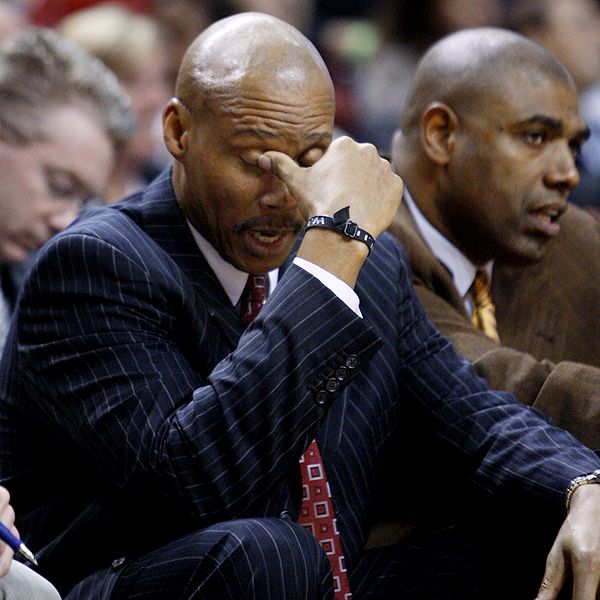 This week will bring an end to the 2012-13 NBA season for the Cleveland Cavaliers and, for the third consecutive season, the Cavs will be sitting at home when the playoffs begin.
This week will bring an end to the 2012-13 NBA season for the Cleveland Cavaliers and, for the third consecutive season, the Cavs will be sitting at home when the playoffs begin.
Much has been made over the past few weeks about the future of Cavs coach Byron Scott, who carries a record of 64-164 as he closes out his third year as coach, making him the longest-tenured coach of a Cleveland sports team. It’s not so much the losing – after all, the Cavs have openly been in rebuilding mode almost from the day Scott took the job – but the historic nature of the losing.
From blowing 20-plus point leads numerous times – including Tuesday night’s in Indiana, when the Cavs became just the second team in the shot-clock era to lose a game that they led by more than 20 points with less than nine minutes to play – to an ongoing lack of attention to defense, many are wondering if Scott will be back for a fourth season when the Cavs return this fall.
All the talk about Scott’s coaching future made us start to wonder just where Scott ranks among Cavs coaches throughout the years. We started following sports in the mid-1970s, so we’ve actually seen every head coach that’s ever led the Cavs onto the hardwood.
The Cavs have had 12 full-time coaches since entering the NBA in the fall of 1970 (we’re not counting interims, so sorry Don Delaney, Keith Smart, Brendan Malone, among others. And really sorry, Chuck Daly). While Scott is not the best coach the Cavs have ever employed, he’s certainly not the worst.
If you went strictly by winning percentage, here is how the list would break down:
- Mike Brown .663
- Lenny Wilkens .551
- Mike Fratello .539
- Paul Silas .473
- Stan Albeck .451
- Bill Fitch .412
- George Karl .409
- Randy Wittman .378
- Tom Nissalke .311
- John Lucas .298
- Bill Musselman .287
- Byron Scott .282
But where is the fun in that? Plus, just going by wins and losses doesn’t take into account the various circumstances that have continually swirled around this franchise since it first took the court in the 1970-71 season.
So where does Scott rank? Let’s find out. While some coaches, like Scott, worked for other teams both before and after coaching the Cavs, we are only counting the time they worked in Cleveland in our rankings.
No. 12: Bill Musselman. 27-67 record in two seasons (1980-81 and 1981-82). No playoff appearances.
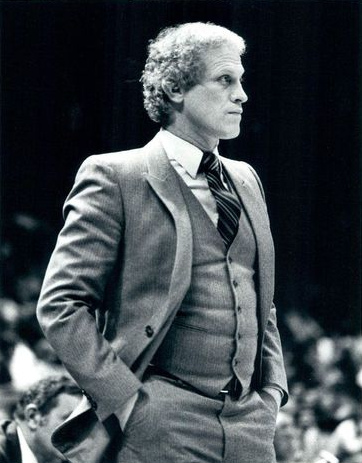 Musselman may have been the most tone-deaf hiring in Cleveland sports history – and that is saying a lot in a town where Mike Lombardi is the current general manager of the Browns.
Musselman may have been the most tone-deaf hiring in Cleveland sports history – and that is saying a lot in a town where Mike Lombardi is the current general manager of the Browns.
As coach at the University of Minnesota in 1972, Musselman worked his players into a frenzy the week of a game against Ohio State. During the game a brawl broke out after Minnesota’s Corky Taylor kneed Ohio State center Luke Witte in the groin and several players repeatedly kicked Witte in the head as he lay on the court.
Which of course made Musselman the perfect choice to coach a team in Cleveland, which probably has the largest Ohio State following outside of Columbus.
Once on the Cavs bench, the party really started. Musselman was:
- Often late to practice because his racquetball game ran long,
- Helped oversee the trading of popular players from the Miracle of Richfield team,
- Had no concept of how to set a playing rotation,
- Was given the bird by Cavs center Dave Robisch during a game,
- Waived Jerome Whitehead just 17 days after trading two No. 1 draft picks for him, and
- Hid in the bushes outside of restaurants so he could spy on his players.
Nearing the end of his first season with the team, and carrying a record of 25-46, Musselman was reassigned to the front office only to return during the 1981-82 season for a 23-game stint that saw the Cavs go 2-21 and close out the season with a 19-game losing streak.
Musselman was fired in the off-season and would return to the NBA for two years with Minnesota, posting a record of 51-113.
No. 11: Randy Wittman. 62-102 record in two seasons (1999-00 and 2000-01). No playoff appearances.
The Cavs gave Wittman his first NBA head coaching job when they hired him in 1999 and Wittman repaid them by starting the franchise on a six-year run of irrelevancy in the NBA.
Wittman was hired on the belief that he would give fans “something exciting to watch” on the court after six seasons of seeing Mike Fratello suck all the fun out of the game. Instead, Wittman delivered two sixth-place finishes and was let go after just two seasons. His 30-52 record in the 2000-01 season was the Cavs worst record in a non-strike season since the 1986-87 season, so he did have that going for him.
“As much as I am concerned about the number of games we lost, I was more concerned about how we lost them,” Jim Paxson, the Cavs general manager at the time, said in announcing Wittman’s firing.
Those comments sound eerily familiar to the current situation the Cavs find themselves in.
It would take Wittman five years before he found another head coaching job. He spent two-and-a-half seasons in Minnesota, where he went 38-105, and he is currently coaching Washington, where he currently has as record of 47-82.
No. 10: John Lucas. 37-87 record in one-and-a-half seasons (2001-02 and 2002-03). No playoff appearances.
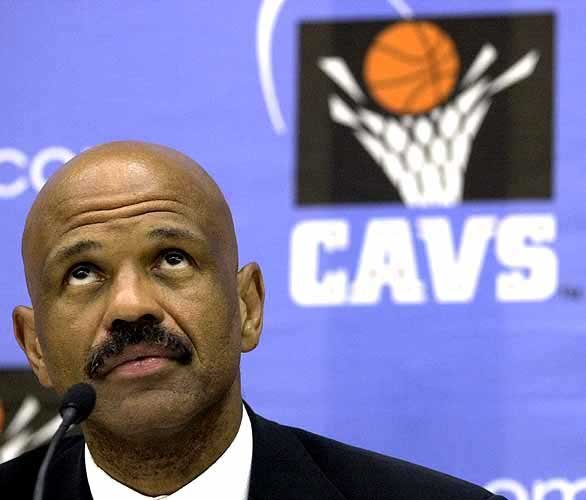 After the Randy Wittman experiment did not work out, the Cavs decided what they really needed was a veteran NBA coach. So they turned the team over to John Lucas, who had gone a combined 136-171 in coaching stints with San Antonio and Philadelphia.
After the Randy Wittman experiment did not work out, the Cavs decided what they really needed was a veteran NBA coach. So they turned the team over to John Lucas, who had gone a combined 136-171 in coaching stints with San Antonio and Philadelphia.
Under Lucas the Cavs were a hot mess, winning just 29 games in his first season. The Cavs were an NBA-worst 8-34 when the team decided that, while a veteran coach may be what they wanted, a veteran coach like Lucas was not what they needed.
Not helping matters was the roster that Lucas had to work with, which included the likes of Ricky Davis, DeSagana Diop, Smush Parker and Dajuan Wagner, among others.
Ah, good times, Cavs fans.
According to an Associated Press article on the firing, the Cavs had blown several second-half leads in games under Lucas and the players on the NBA’s youngest team were not showing the kind of progress that the front office was looking for.
Sound familiar to anyone?
No. 9: Tom Nissalke. 51-113 record in two seasons (1982-83 and 1983-84). No playoff appearances.
Two weeks before the opening of the 1982-83 NBA season, the Cavs got rid of Bill Musselman and hired Tom Nissalke, one of the few coaches available for hire so close to the start of the season.
Under Nissalke, who had been Coach of the Year in 1976-77 with Houston, the Cavs saw a modest improvement that year, going from 15 wins to 23, but more importantly started to look and act like a professional team again.
“The main thing is that I wanted to stop the laughing – because we were the laughingstocks of pro basketball and probably all of pro sports,” then general manager Harry Weltman said in the 1994 book, Cavs: From Fitch to Fratello. “Nissalke did a good job because he was there, really, to instill some discipline and bring more organization to the team than there had been in the past.”
Nissalke coached the Cavs when they were probably at their all-time lowest as he was there for the end of the Ted Stepien era. In his first season as coach, average attendance at the Coliseum was 6,200 (apparently Cleveland was not a “Cavs Town”).
While the Cavs improved in Nissalke’s second season to 28 wins, he fell out of favor with the front office because he was reluctant to give young players like John Bagley and Roy Hinson more playing time. He was shown the door in the spring of 1984 and Cleveland would be his last NBA coaching stop.
No. 8: Stan Albeck. 37-45 record in one season (1979-80). No playoff appearances.
After moving on from Bill Fitch, the franchise’s first coach, the Cavs turned to Stan Albeck, who had coached the Denver Rockets for one year in the ABA.
Albeck was not popular with the veteran players on the team and quickly clashed with center Jim Chones.
“I heard (Albeck) was a screamer and crier. I don’t like criers,” Chones said in Cavs: From Fitch to Fratello. “He’d use chars and illustrations to try and get (his) points across to us. It was a joke. We used to sit there and laugh at this guy.”
Chones was traded to the Los Angeles Lakers during training camp and Bingo Smith, another popular player from the Miracle of Richfield team, was dealt a month into the season, which did not help Albeck’s stock with the fans.
The Cavs would muddle through the season before winning 10 of their final 12 games to fall just two games short of a playoff spot.
The biggest transition during Albeck’s time in Cleveland, though (other than using a No. 1 draft pick on Chad Kinch), was Nick Mileti selling controlling interest of the Cavs to Ted Stepien.
A day after making that selection Albeck resigned so he could take over the coaching job with San Antonio, despite having two years remaining on his contract with the Cavs. It would eventually come out that Miletti had given Albeck an out clause in his contract that Stepien did not know about.
Knowing how the Stepien era would turn out for the Cavs, Albeck’s move to San Antonio may have been the best decision he made during his time in Cleveland.
No. 7: Paul Silas. 69-77 record in almost two seasons (2003-04 to 2004-05). No playoff appearances.
Following four consecutive seasons of 50-plus losses and holding the No. 1 overall pick in the upcoming NBA Draft, the Cavs decided that what they needed was a veteran coach (just not a veteran coach like John Lucas).
The Cavs turned to Paul Silas, who has just been let go after five seasons with the Hornets, one in New Orleans after the franchise moved from Charlotte. Silas had also coached the Clippers when they were still in San Diego.
Silas was brought on board to mentor a young team that included Dajuan Wagner, Ricky Davis, Darius Miles and Carlos Boozer. But most importantly, he was hired to work with LeBron James, who the Cavs would draft that June.
In his first season, Silas guided the Cavs to an 18-game improvement but the team lost Boozer in a free-agent deal gone bad after that season. The next year, the Cavs were in first place for most of the first two months, but slumped after the All-Star break and had lost nine-of-12 games when the decision was made to fire Silas with 18 games left in the season.
Then general manager Jim Paxson criticized Silas in announcing the decision to fire him, which was a bit rich as Silas was the third coach that Paxson had hired and subsequently fired during his time in Cleveland. Paxson joined Silas on the bus out town at the end of the season as new owner Dan Gilbert had seen enough of Paxson’s work to know it was time to move on.
Even though he was hired to run a young team, Silas was an old-school coach, however, that seemed to have little patience for the younger generation of NBA players. He famously clashed with Ira Newble after a game in Atlanta and throwing Eric Snow off the bench during a game in Atlanta.
No. 6: Byron Scott. 64-164 in his third season (2010-11 through now). No playoff appearances.
This just feels like the right spot to place Scott. You can’t put him ahead of any of the coaches who had playoff teams and, despite all the losing under Scott, there has not been the level of dysfunction seen under previous coaches.
Or it could be that the Cavs have employed plenty of lousy coaches over the years and Scott is just the best of a bad bunch.
The Cavs hired Scott just a few days before LeBron James announced that he was leaving as a free agent. It’s been an uphill battle for Scott and the Cavs ever since.
Scott came to town with a reputation for knowing how to coach point guards after working with Jason Kidd in New Jersey and Chris Paul in New Orleans. That experience paid off when the Cavs drafted point guard Kyrie Irving with the No. 1 pick in the 2011 NBA Draft.
Scott has been tasked with developing a young team as the Cavs try to work themselves back toward the top of the NBA without taking any shortcuts. That hasn’t always been easy and while losing is to be expected, things have taken a turn toward the historic (and not in a good way) quite often under Scott.
Consider:
- The 26-game losing streak in the 2010-11 season, the longest in NBA history.
- The 41-point loss to Portland in March of 2011. After the game, Scott said the Cavs were “so soft mentally it’s unbelievable.”
- The 55-point loss to the Lakers in January of 2011, a game in which the Cavs scored just 57 points. A game where Scott said the team looked “flat-out scared.”
- The 29-point loss to Chicago back in November. A game that Scott called “a good, old-fashioned butt-whipping.”
- The 39-point loss to the Bulls in January of last season, the worst home loss in franchise history. “We have a long way to go. We have a lot of work to do,” Scott said after the game.
- The March loss to the Heat, when the Cavs couldn’t hold on to a 27-point lead in the third quarter. The rest of the league wins almost 97 percent of the time when they hold a lead that big. In addition, in the past 15 seasons NBA teams had five wins against 2,013 losses (yes, you read that right) when trailing by 27 or more points in the second half. The Cavs? Well, they like to do things differently.
- A 38-point loss to Houston in March, the worst of the season.
Is all of this Scott’s fault? No. But he does have to carry his share of the water for the fact that the Cavs have gotten worse on defense each year that Scott has been in charge.
Whether or not he has a chance to move up this list is a question for another day.
No. 5: George Karl. 61-88 in a season-and-a-half (1984-85 and 1985-86). One playoff appearances.
Karl was the first coach hired under the ownership of George and Gordon Gund and, at age 33, the youngest coach hired in franchise history. While for one year it seemed like the Cavs were moving in the right direction, the Cavs (and Karl) quickly found out that he wasn’t ready for the responsibility.
Karl clashed with the team’s lone marquee player, World B. Free, because Free did not like to play defense. Karl also wanted an offense that did not rely solely on Free – a decision that did not sit well with a player who believed that any shot he took was a good one.
The Cavs opened their first season under Karl by losing 19 of their first 21 games. But just when it seemed like everything was falling apart, Karl and Free came to an agreement, Karl lightened up a little bit on the rest of the players, and the Cavs improbably earned their first playoff berth in seven years.
The Cavs would fall in four games to Boston in the first round of the playoffs, with both teams scoring a total of 449 points in the series. The difference ended up being the fact that the Celtics took 25 more free throws than the Cavs during the series.
The close playoff loss led to conflict the next season between Karl and general manager Harry Weltman, with Karl openly talking to the University of Pittsburgh during the season about their coaching job. Even though Weltman and the Gunds told Karl to cool it with the Pittsburgh talk, when they found out that Karl was still flirting with the Panthers they fired Karl with 15 games left in the 1985-86 season.
After leaving Cleveland, Karl would go on to coach Golden State, Seattle (where he made one NBA Finals appearance), Milwaukee and, since 2004-05, Denver.
No. 4: Mike Fratello. 248-212 in six seasons (1993-94 to 1998-99). Four playoff appearances.
By Cavs standards, Fratello was very successful as coach. The team had a winning record in every season but his last and made the playoffs four times.
“I always admired how Mike’s teams played in Atlanta (where Fratello coached for eight years),” then-Cavs general manager Wayne Embry said in Cavs: From Fitch to Fratello. “Regardless of how they got there, they won a lot of games. There’s nothing wrong with bringing this kind of intensity to the job, or having his kind of passion for winning.”
If the goal was to make the playoffs, then Fratello was the man for the job.
If the goal was to play entertaining basketball and actually win in the playoffs, well that’s another story.
Under Fratello the Cavs played some of the ugliest offensive basketball ever seen in Cleveland, with the Cavs finishing at or near the bottom of the league on offense. As for the playoffs, the Cavs compiled a 2-12 record under Fratello as they lost in the first round every time they made the postseason.
Fratello also clashed with players and the media when reporters reported on those arguments.
When Fratello was fired in June 1999, the team also announced that Embry would be leaving, with Jim Paxson taking over the general manager’s role.
If you’ve made it this far, you know how well things worked out with Paxson making the hiring decisions when it came to Cavs coaches.
No. 3: Bill Fitch. 304-434 record in nine seasons (1970-71 to 1978-79). Three playoff appearances with one Eastern Conference Finals appearance.
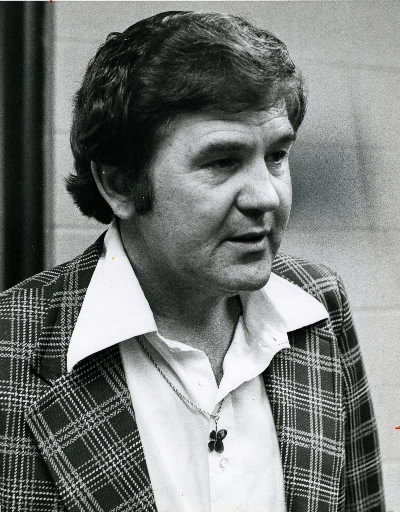 Cavs fans of a certain age will always have a soft spot for Fitch, the coach of the Miracle in Richfield team, which made it a little bit harder to know where to slot him in.
Cavs fans of a certain age will always have a soft spot for Fitch, the coach of the Miracle in Richfield team, which made it a little bit harder to know where to slot him in.
Fitch was hired as the expansion team’s first coach and five years later had them in the Eastern Conference Finals. And along the way, Cleveland fell in love for the first time with an NBA team, which goes a long way toward explaining why that squad still holds a special place in the hearts of Cleveland fans almost 40 years later.
For 36 nights the Cavs took a fan base that was starved for something good to happen on a wild ride, with the fans being almost as much participants as spectators. There was no need for fireworks or carnival barkers screaming like lunatics into the microphone, all the team needed was the fans and all the fans wanted was the Cavs.
Every home playoff game the Coliseum rocked to the chants of “We want the Cavs” well before the players came out for their warm-ups. The fans were so loud that the chalkboards in the locker rooms shook from the vibrations.
There’s no doubt that Fitch would be at the top of this list if Jim Chones had not broken his foot before the start of the conference finals with Boston. There is no doubt that Cleveland was better than Boston (despite what Bill Simmons may have you believe) and they were certainly better than Phoenix. If it wasn’t for that bad break, Fitch would have been the coach of the only Cavs team to date to win an NBA Championship.
Unfortunately that spring was the high point of Fitch’s tenure in Cleveland, and things actually started to fall apart during the Boston series. On the return flight to Cleveland, owner Nick Mileti and Fitch got into an argument over Fitch’s contract, with Mileti subsequently criticizing Fitch to the media.
The team was never able to capture that magic again due in part to injuries and, just three years later, Fitch was out after a 30-win season, having resigned because he was burned out and ready for a change.
Two days after resigning from the Cavs, Fitch took over as coach of the Celtics, where he would win the NBA title that eluded him in Cleveland. He would also coach Houston, New Jersey and the L.A. Clippers before retiring after the 1997-98 season.
No. 2: Mike Brown. 272-138 in five seasons (2005-06 to 2009-10). Five playoff appearances, two Eastern Conference Finals, one NBA Finals.
In a lot of ways Brown was the most difficult coach to place on the list.
When you look at what Brown accomplished with the Cavs, he should be firmly at the top of the list. As Cavs coach, Brown:
- Won the third-most games in team history with 272 wins;
- Has the highest winning percentage in franchise history;
- Won the most postseason games in team history with 42 wins;
- Coached the team to the playoffs five straight years;
- Coached the team past the first round of the playoffs every year;
- Posted at least 45 wins five straight years, the first time in team history;
- Posted back-to-back 60-win seasons.
But Brown was fortunate enough to coach the most-talented player in franchise history – LeBron James – and wasn’t able to bring the team to an NBA championship. So he can’t be at the top of the list despite his accomplishments.
At first we wanted to drop him below Fitch, who did more with less, but Fitch only won the one playoff series with the Cavs, so it doesn’t feel right to put Brown below him.
Despite how things ended in Cleveland, with Brown being made a scapegoat in a desperate attempt to get James to resign with the team, he was part of the best five-year run in franchise history.
No. 1: Lenny Wilkens. 316-258 in seven seasons (1986-87 to 1992-93). Five playoff appearances, one Eastern Conference Final.
Lenny Wilkens was the right coach at the right time for the Cavs.
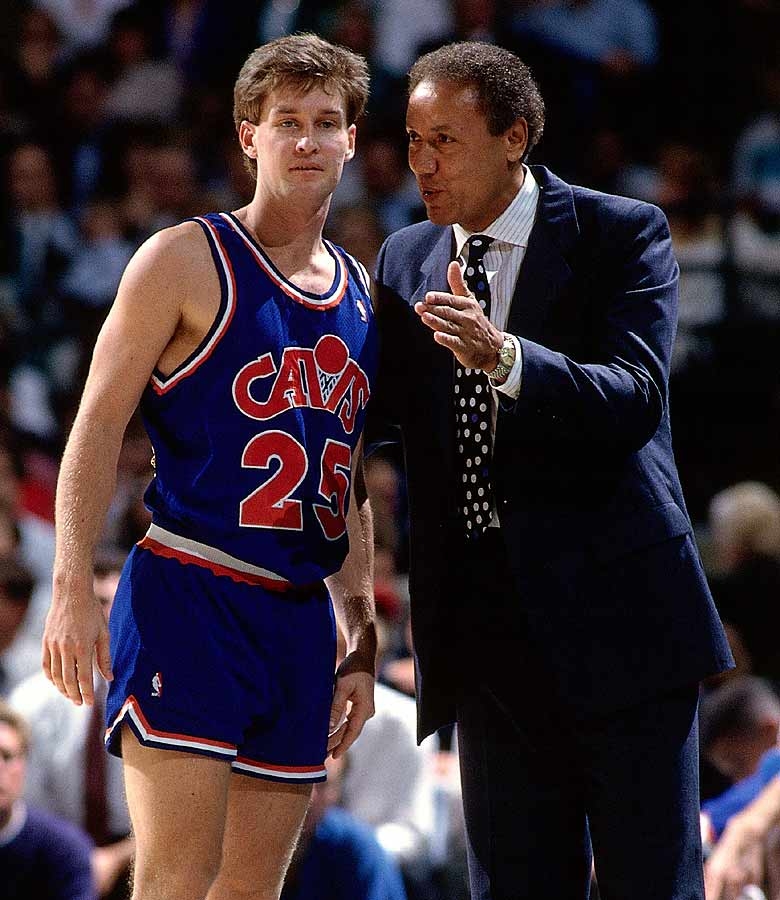 After coming out of the darkness that was the Ted Stepien ownership era, Wilkens brought a level of professionalism and expertise to the team that was sorely needed.
After coming out of the darkness that was the Ted Stepien ownership era, Wilkens brought a level of professionalism and expertise to the team that was sorely needed.
Wilkens and general manager Wayne Embry put together a team that played basketball the right way, one that Magic Johnson called the “Team of the ’90s,” and one that looked like it was going to finally bring a championship to Cleveland.
The trade of Ron Harper – only one of the worst deals in Cleveland sports history – started to short-circuit the championship dreams, however, and then Michael Jordon put paid to those dreams as Wilkens had the misfortune to coach in the same division as the Chicago Bulls.
Four times the Cavs saw their season come to an end in the playoffs against Chicago, as no matter what he tried, Wilkens and the team just couldn’t get past Jordon and Bulls.
Even though he couldn’t get past the Bulls, Wilkens taught the Cavs to win, taught them the importance of defending their home court, and his seven-year run provided some of the best basketball memories that Cavs fans currently have.
Even though Wilkens time in Cleveland did not end with a championship, he is still the franchise's best coach to date.
- NBA Announces 2013-2014 Schedule
- Browns Ink Sharknado
- Sharknado A No-Show For Rookie Camp
- Trent Richardson Out Until Training Camp
- Browns Sign Brandon Jackson
- Carrasco Suspended Eight Games
- Browns Add to Wide Receiver Depth with David Nelson
- Browns Need to Learn from Past Draft Mistakes
- Browns Release Chris Gocong and Usama Young
- Browns Missing on Grimes Disappointing, But Not The End
The TCF Forums
- Official- Browns Coach Search/Rumors
HoodooMan (Tuesday, January 21 2014 1:36 PM) - Movies coming out
rebelwithoutaclue (Tuesday, January 21 2014 12:56 PM) - 2015 Recruiting
jclvd_23 (Tuesday, January 21 2014 12:38 PM) - The 2014 Offseason Thread
Larvell Blanks (Tuesday, January 21 2014 12:25 PM) - Chris Grant's first 3 drafts
Kingpin74 (Tuesday, January 21 2014 10:13 AM) - Mike Brown
YahooFanChicago (Monday, January 20 2014 11:15 PM) - 2014 Hoops Hockey Hijinx
jpd1224 (Monday, January 20 2014 4:44 PM) - 2014 Recruiting
jclvd_23 (Monday, January 20 2014 2:26 PM) - Wish List - #4 Pick
Hikohadon (Monday, January 20 2014 1:26 PM) - #1 overall pick Anthony Bennett
TouchEmAllTime (Sunday, January 19 2014 1:28 PM)


